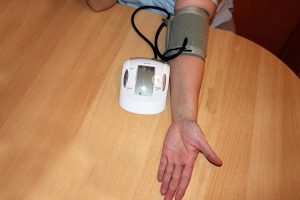Systemic arterial hypertension, recognized by the acronym SAH and also commonly known as high blood pressure, is a chronic disease characterized by the increase in blood pressure. According to research by the Brazilian Institute of Geography and Statistics (IBGE), the illness has been increasing steadily every year, affecting people of all ages and becoming one of the main causes of serious health complications.
What Values Are Considered High Blood Pressure?
Blood pressure is considered high when readings are equal to or greater than 140 / 90mmHg, and a diagnosis of hypertension is made when these values remain constant over a period of time. It is always important to check both systolic and diastolic pressure for confirmation. These values are measured with specific devices, which may include a sphygmomanometer together with a stethoscope or digital devices that can be purchased in pharmacies and drugstores at an affordable price, making monitoring and measurement easier even at home.
What Are Systolic and Diastolic Pressure?
During heartbeats, the heart pumps blood through the arteries, distributing it throughout the body. This function causes pressure on the arteries, called systolic blood pressure. Diastolic pressure is the measure of pressure in the arteries between one heartbeat and another, called the resting phase (1,2 and 3).
Reference Values for Blood Pressure and Indication of Systemic Arterial Hypertension
The references below are for an adult over 18 years old, classified as 1, 2, and 3.
- Optimum Pressure: Systolic pressure < 120 and diastolic pressure <80 – 12 X 8
- Normal Pressure: Systolic pressure <130 and diastolic pressure <85 – 13 X 8
- Borderline Pressure: Systolic pressure 130-139 and diastolic pressure 85-89
- Stage 1 Hypertension: Systolic pressure 140-159 and diastolic pressure 90-99
- Stage 2 Hypertension: Systolic pressure 160-179 and diastolic pressure 100-109
- Stage 3 Hypertension: Systolic pressure = 180 and diastolic pressure =110
- Isolated Systolic Hypertension: Systolic pressure =140 and diastolic pressure <90
How and When to Measure Blood Pressure
Blood pressure should always be checked during routine appointments. If you are part of a risk group, extra care should be taken and any different symptoms should be monitored carefully. If there are cases in your family of systemic arterial hypertension, check your pressure whenever possible to ensure everything is under control.For hypertensive patients, blood pressure should be measured at least once a week. In people considered healthy, it should be checked once a year during routine appointments, except if you notice any unusual symptoms in your body, such as persistent dizziness, headache, nausea, or blurred vision.For the best way to measure, ensuring values are correct and accurate, there are a few tips for proper blood pressure measurement. The most recommended are:
- Preferably measure in the morning while still fasting;
- After urinating;
- Be at rest for at least 5 minutes, no exertion;
- Be seated and keep your arm still during the measurement.
The consumption of certain drinks like coffee and even the consumption of alcohol and smoking before measuring blood pressure can cause changes in results. At the time of checking, it is necessary to be calm, relaxed, not cross your legs, refrain from talking, and breathe calmly while the device takes the measurement.
Systemic Arterial Hypertension Risk Groups
As with any disease, it is not possible to predict who, how, and when it will manifest. But in the case of hypertension, it is possible to have an alert if you are in a risk group for the disease. Some people have a higher chance of developing the disease, including:
- Obese individuals;
- Alcoholics;
- Diet high in salt;
- Sedentary lifestyle;
- Smokers;
- Elderly;
- People with a family history of hypertension
Other factors such as gender and ethnicity are also risk factors, since in most cases hypertension occurs in men and individuals with Black or mixed-race ancestry. People with altered levels of cholesterol and triglycerides are also at risk.
Complications of Systemic Arterial Hypertension
The main complications of systemic arterial hypertension include stroke, heart attack, chronic kidney disease, and even muscular atrophy of the heart, which causes cardiac arrhythmia. It is important to highlight that high blood pressure, because it causes changes throughout the body, presents not only short-term risks but also long-term complications, such as eye problems up to loss of vision.One of the most concerning complications, especially in men who are still of reproductive age and have not started a family, is sexual impotence or erectile dysfunction as it is called in medicine. Systemic arterial hypertension, if not treated correctly, can cause irreversible health damage, including to fertility, especially in men. For an erection to occur, it is necessary for blood flow in the penile area to be normal, as this is responsible for the firmness of the penis. Proper blood flow ensures the penis becomes erect and stays that way throughout sexual intercourse. If this flow is interrupted or occurs abnormally, erectile dysfunction may result.If you want to have an active and healthy sex life, take care of your health and always follow the treatment recommended by your doctor. Change your habits by adopting a healthy diet, practicing physical activity, and maintaining a calmer routine.Important Tip: Good overall health is essential for fertility. Famivita has developed products that can help couples trying to conceive. Check out all products and vitamins for fertility here.See also: Does Diabetes Have a Cure?Photo: torange.biz











